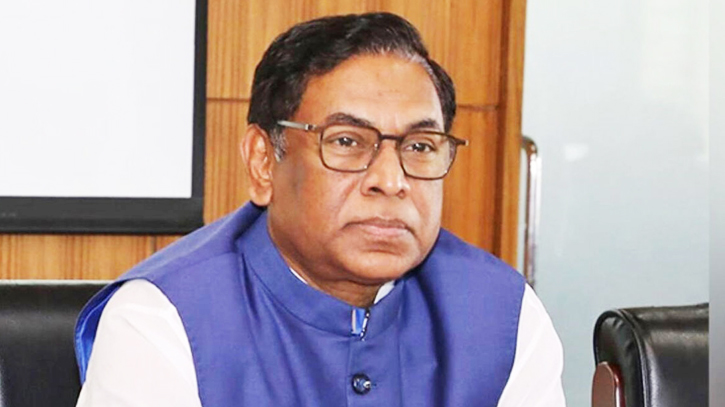
Photo : Collected
State Minister for Power, Energy, and Mineral Resources, Nasrul Hamid Bipu, MP identifies investment and the assurance of a consistent supply of primary energy for electricity generation as the major challenges facing the country. Despite these challenges, the government is prepared to tackle them head-on through a multifaceted strategy, ranging from the exploration of local resources to the import of electricity, gas, or LNG. Hamid said that the government is ready to invest as much as necessary. He however admitted that it would not be possible for the government alone to invest, yet it is designing an investment roadmap up to 2041. The junior minister also dwelt on other aspects of the country’s energy situation, problems and prospects in an exclusive interview with Jannatul Ferdushy of The Daily Messenger.
Messenger: What is the main challenge for the government right now for energy sector development? Do you think that the target of fuel mix set at PSMP 2030 can be achieved?
NH: The main challenge for energy sector development is to ensure supply of primary energy at an affordable price. A multipronged approach is necessary to meet this challenge. This approach may consist of exploration for oil and gas, exploitation of indigenous coal, import of gas and LNG, import of coal, development of renewable energy resources etc. Appropriate policy and concerted effort in execution of programs in light of the policy will enable the energy and power sector to achieve target of fuel mix set at Power Sector Master Plan (PSMP) 2030.
The two main challenges of achieving the goals of PSMP are ensuring investment and ensuring supply of primary energy. To solve these problems, we lack institutional framework and skilled human resources.
On the other hand, there is also an assurance of getting finance from own resources by the finance ministry. Besides, the financing problem could also be solved through foreign investment, donors and international financial institutions and bidder’s finance.
It may be mentioned here that the Awami League has achieved success more than what it pledged for the last five years. I am optimistic that we would be able to reach our goals set up until 2030 through facing the challenges.
We will start working on setting up super critical power plant to use our own quality coal. We will have to wait for some time for this.
Messenger: Primary energy is the main challenge for 40,000-megawatt electricity generation by 2030. Some 20,000 megawatt is to come from coal. What kind of infrastructure you are planning for it? Are you really optimistic to get targeted electricity from coal as described in the PSMP?
NH: The works on coal transportation and handling infrastructure has been setup simultaneously with the setting up of Rampal Power Plant. You know 1,200MW coal-based power plant at Matarbari financed by JICA has been completed. Another 1200MW capacity coal plant would also be set up there.
A plan has been finalised to construct infrastructure for coal import necessary to meet the power generation in accordance with the PSMP. Works in accordance with the plan would be started within this year and the works would progress fast once it is started.
Messenger: What are the steps you will take for gas exploration both onshore and offshore? Some experts think BAPEX alone is not capable for onshore exploration. Do you have any plan for onshore PSC?
NH: BAPEX is already carrying out exploration activities in the onshore and international oil companies are engaged in exploration in the offshore. In recent years BAPEX’s capability in exploration has been enhanced. After acquiring state of the art seismic survey technology and new drilling rigs, BAPEX is in better position than ever before. Considering the size of the country, BAPEX alone should be capable of carrying out exploration activities in the onshore, especially in the plain land.
However, we need to know what resources we have to undertake future plans. The government is considering to undertake non-speculative seismic survey across the country.
Messenger: Some proposals of JV with BAPEX are under consideration of the government. Is there any plan to give final approval to the proposals, or any plan to reject those? Specially, what is your plan about the JV proposal for exploration in the hill tracts?
NH: We have invested more than other governments to strengthen BAPEX. So, we will not bring outsiders in any area where BAPEX has the capability to perform. At the same time, we have to keep in mind that BAPEX would not be able to go anywhere having risks to invest. We are considering a proposal of BAPEX and Chinese company joint venture to explore CHT as the government is considering the proposal to improve gas supply to crisis-ridden Chittagong.
Messenger: The country will need $ 80 billion for energy sector by 2030. What will be the sources of investment? Have you chalked out any plan?
NH: I have earlier discussed about the investment challenges. The government is ready to invest as necessary. But we should keep in mind that nowhere in the world the government alone could meet the investment needs. It is not also possible for us.
Messenger: It is alleged that the energy and power sector is losing human resources due to brain-drain. So, there is a demand that the retirement age in the sector be made 65. What do you say?
NH: Energy and power sector is losing human resources due to brain-drain. The main reasons are low salary and perks under the unified national pay scale. Attractive financial package, conducive working environment and career building opportunities may revert to this migration trend. Only extension of retirement age will not be enough to stop brain-drain.
Messenger/Fameema








